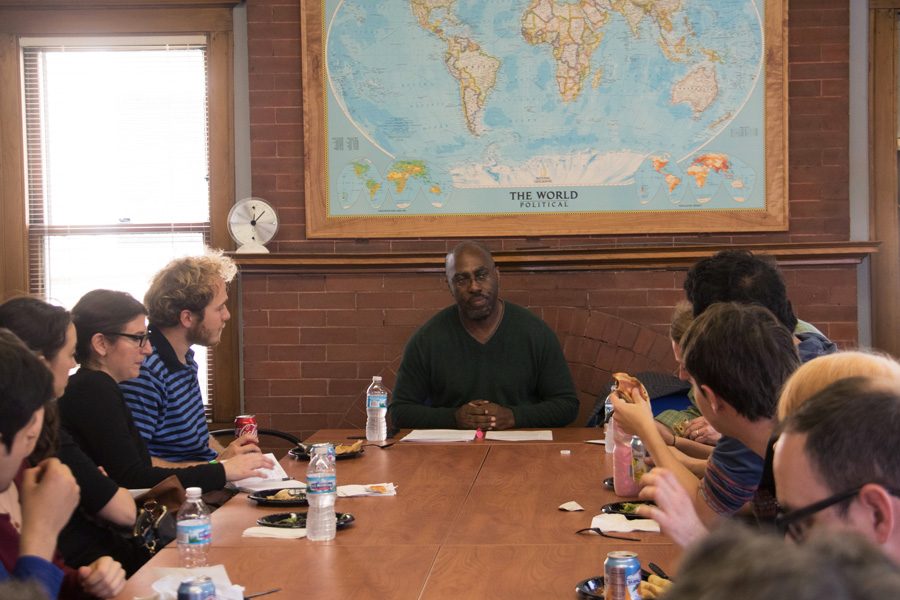Prof. Barnor Hesse discusses origins, evolution of contemporary racism at Buffett Institute event
Keshia Johnson/The Daily Northwestern
Weinberg Prof. Barnor Hesse speaks at the Buffett Institute for Global Studies. Hesse teaches in the departments of African American studies, sociology and political science.
May 8, 2016
The West did not begin to reject racism until it affected Europeans, Weinberg Prof. Barnor Hesse argued at his talk Friday hosted by the Buffett Institute for Global Studies.
During his talk, “Racism’s Alterity,” Hesse described how the West grew to reject certain aspects of racism in the mainstream by discussing the origins, evolution and current state of contemporary racism. Political science Prof. Brian Hanson, director of research and strategic planning at the Buffett Institute, introduced Hesse at the beginning of the talk, which was followed by a Q&A with the audience of about 80 people.
Hesse, who teaches in the departments of African American studies, sociology and political science, focused on racism in the context of World War II, Nazism and colonialism to illustrate its evolution on a global scale.
“(Critiquing racism) emerges at the point of wanting to critique the violation of white populations, so that its conceptual lineage has little to nothing to do with non-white populations,” Hesse said.
Hesse described the history of racism, arguing racism in its current form began in the 1890s in the context of anti-Semitism and nationalism in Europe. The word racism, Hesse said, originally referred to the belief in the existence and significance of one’s race, then often synonymous with one’s nationality.
Western powers began to reject racism during World War II, Hesse said, as Nazi Germany began to colonize the rest of Europe, treating Jewish and Slavic people as subhuman. Hesse said this rejection of racism, however, was restricted to white people and did nothing to confront their own beliefs of white supremacy exercised in colonizing parts of Africa and Asia.
“The western, liberal, colonial regimes, in order to critique Nazism, is making the implicit argument (Jewish people) are white, and you’re violating white populations,” Hesse said. “Because if they conceded that they were not white … they would have to say something about all of the non-white populations who were being violated with colonialism.”
Hesse said the fear of colonization of Europe that was not matched with an equal resentment toward colonization of people of color represents the Western-centered views on racism in the early 20th century. These ideas based in colonialism continue to influence contemporary understanding of racism today.
Hanson said he appreciated the global view of racism Hesse provided. An international understanding of racism in the world aligns with the mission of the Buffett Institute in educating on global issues, he said.
“One of the things the Buffett Institute tries to do is to link people together in new ways,” Hanson said. “And one of the things I hope we’ve accomplished with this is get people … to be introduced in the way that Barnor is thinking about these things, to be able to hopefully then engage in dialogue.”
Weinberg sophomore Callie Leone said she appreciated the opportunity to hear Hesse speak as she has not taken a class with him.
“I’ve heard a lot of people on campus commenting on how amazing Prof. Hesse is,” Leone said. “I never really thought of it in the sense that the reason why people were so ardent that Jews were white was because then they’d have to recognize they were being crappy to everyone else.”
Email: [email protected]
Twitter: @matthewchoi2018


